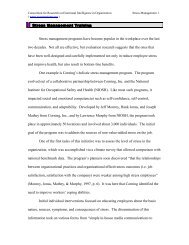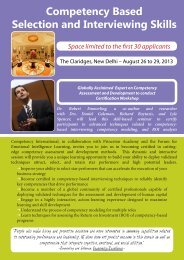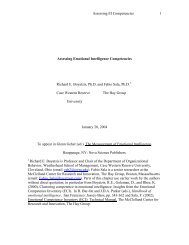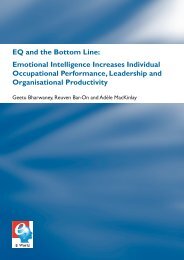Unleashing the Power of Self-Directed Learning (.pdf)
Unleashing the Power of Self-Directed Learning (.pdf)
Unleashing the Power of Self-Directed Learning (.pdf)
You also want an ePaper? Increase the reach of your titles
YUMPU automatically turns print PDFs into web optimized ePapers that Google loves.
Consortium for Research on Emotional Intelligence in Organizations<br />
www.eiconsortium.org<br />
<strong>Self</strong> <strong>Directed</strong> <strong>Learning</strong><br />
14<br />
many reasons why we may not live up to o<strong>the</strong>rs’ expectations or wishes, and not change or<br />
learn according to <strong>the</strong>ir agenda! In current psychology, o<strong>the</strong>rs’ version <strong>of</strong> what our Ideal<br />
<strong>Self</strong> should be is referred to as <strong>the</strong> “Ought <strong>Self</strong>.”<br />
We may be victims <strong>of</strong> <strong>the</strong> expectations <strong>of</strong> o<strong>the</strong>rs and <strong>the</strong> seductive power <strong>of</strong><br />
popularized images from <strong>the</strong> media, celebrities, and our reference groups. In his book, The<br />
Hungry Spirit: Beyond Capitalism, A Quest for Purpose in <strong>the</strong> Modern World (1997),<br />
Charles Handy describes <strong>the</strong> difficulty <strong>of</strong> determining his ideal. “I spent <strong>the</strong> early part <strong>of</strong><br />
my life trying hard to be someone else. At school I wanted to be a great athlete, at<br />
university an admired socialite, afterwards a businessman and, later, <strong>the</strong> head <strong>of</strong> a great<br />
institution. It did not take me long to discover that I was not destined to be successful in<br />
any <strong>of</strong> <strong>the</strong>se guises, but that did not prevent me from trying, and being perpetually<br />
disappointed with myself. The problem was that in trying to be someone else I neglected to<br />
concentrate on <strong>the</strong> person I could be. That idea was too frightening to contemplate at <strong>the</strong><br />
time. I was happier going along with <strong>the</strong> conventions <strong>of</strong> <strong>the</strong> time, measuring success in<br />
terms <strong>of</strong> money and position, climbing ladders which o<strong>the</strong>rs placed in my way, collecting<br />
things and contacts ra<strong>the</strong>r than giving expression to my own beliefs and personality. (pg.<br />
86)” In this way, we allow ourselves to be anes<strong>the</strong>tized to our dreams and lose sight <strong>of</strong> our<br />
deeply felt Ideal <strong>Self</strong>.<br />
The Second Discontinuity: Am I a Boiling Frog?<br />
The awareness <strong>of</strong> <strong>the</strong> current self, <strong>the</strong> person that o<strong>the</strong>rs see and with whom <strong>the</strong>y<br />
interact, is elusive. For normal reasons, <strong>the</strong> human psyche protects itself from <strong>the</strong><br />
automatic “intake” and conscious realization <strong>of</strong> all information about ourselves. These egodefense<br />
mechanisms serve to protect us. They also conspire to delude us into an image <strong>of</strong>






